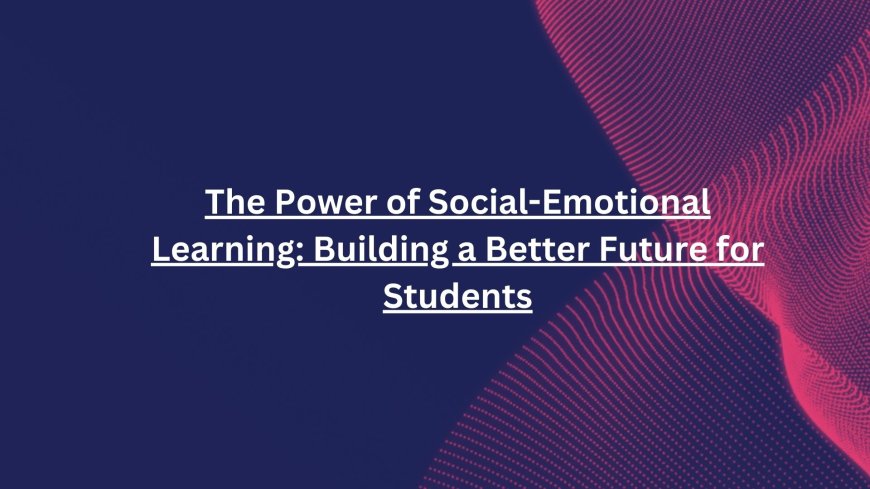The Power of Social-Emotional Learning: Building a Better Future for Students

In the evolving landscape of education, there's growing recognition of the importance of not just academic success, but also the development of students' social and emotional skills. Social-Emotional Learning (SEL) has emerged as a critical component in education, emphasizing the need for students to manage emotions, build healthy relationships, and make responsible decisions. This blog delves into the significance of SEL, its core components, and its profound impact on students' overall well-being and academic performance.
Understanding Social-Emotional Learning (SEL)
Social-Emotional Learning (SEL) is a framework that encompasses the development of five key competencies: self-awareness, self-management, social awareness, relationship skills, and responsible decision-making. These skills are essential for students to navigate their personal and academic lives effectively, fostering resilience, empathy, and a positive sense of self.
The Five Core Competencies of SEL
-
Self-Awareness: This involves recognizing one's own emotions, strengths, and limitations. It includes understanding how emotions influence behavior and having a realistic sense of self-confidence.
-
Self-Management: This competency focuses on regulating one's emotions, thoughts, and behaviors in different situations. It includes managing stress, controlling impulses, and setting and working toward personal and academic goals.
-
Social Awareness: This involves understanding and empathizing with others, including those from diverse backgrounds and cultures. It includes recognizing social norms and cues and understanding the perspectives of others.
-
Relationship Skills: This competency emphasizes the ability to establish and maintain healthy and rewarding relationships. It includes clear communication, active listening, cooperation, conflict resolution, and seeking and offering help when needed.
-
Responsible Decision-Making: This involves making ethical, constructive choices about personal and social behavior. It includes considering the well-being of oneself and others, evaluating the consequences of actions, and making decisions based on safety and social norms.
The Importance of SEL in Education
-
Academic Achievement: Research has shown that SEL positively impacts students' academic performance. Students who develop strong social-emotional skills tend to have better grades, higher test scores, and improved attendance. SEL helps create a supportive and positive school climate, which is conducive to learning.
-
Mental Health: SEL plays a crucial role in promoting mental health and well-being. By teaching students how to manage stress, cope with challenges, and build positive relationships, SEL can reduce the prevalence of mental health issues such as anxiety and depression.
-
Behavioral Outcomes: Students with strong social-emotional skills exhibit fewer behavioral problems and disciplinary incidents. SEL encourages positive behavior, reducing instances of bullying, aggression, and other negative behaviors.
-
Lifelong Success: The skills learned through SEL are not only applicable in the classroom but also essential for success in life. These skills help individuals build meaningful relationships, excel in the workplace, and contribute positively to their communities.
Implementing SEL in Schools
Successful implementation of SEL requires a comprehensive approach that involves educators, students, parents, and the community. Here are some strategies for integrating SEL into the educational environment:
-
Curriculum Integration: SEL should be integrated into the existing curriculum through dedicated lessons and activities. Subjects such as language arts, social studies, and health can incorporate SEL themes to reinforce these skills.
-
Teacher Training: Educators need professional development and training to effectively teach SEL. They should be equipped with strategies to foster a supportive classroom environment and model social-emotional skills.
-
Family and Community Engagement: Involving families and the community in SEL initiatives is crucial. Schools can organize workshops and provide resources to help parents reinforce SEL skills at home.
-
Creating a Supportive Environment: Schools should foster a positive and inclusive climate where all students feel safe, respected, and valued. This includes addressing issues such as bullying and promoting a culture of empathy and kindness.
-
Continuous Assessment and Improvement: Regular assessment of SEL programs helps in identifying areas of improvement and ensuring that the initiatives are meeting the desired outcomes. Feedback from students, teachers, and parents can guide the refinement of SEL strategies.
Challenges and Considerations
Despite the benefits, implementing SEL in schools comes with challenges:
-
Resource Allocation: Adequate funding and resources are essential for the successful implementation of SEL programs. Schools may face budget constraints that limit their ability to provide comprehensive SEL training and materials.
-
Resistance to Change: Some educators and parents may be resistant to integrating SEL into the curriculum, viewing it as secondary to academic instruction. Building awareness and demonstrating the value of SEL can help overcome this resistance.
-
Cultural Sensitivity: SEL programs must be culturally sensitive and inclusive, reflecting the diverse backgrounds and experiences of students. Tailoring SEL initiatives to meet the needs of different communities is crucial for their effectiveness.
Conclusion
In conclusion, Social-Emotional Learning is a transformative approach that equips students with essential life skills, fostering their emotional well-being, academic success, and overall development. By prioritizing SEL, educators and schools can create nurturing environments that prepare students for the complexities of the modern world. The integration of SEL into the educational system is not just an investment in individual students, but a commitment to building a compassionate, resilient, and thriving society. As we continue to recognize the importance of social and emotional development, let us work together to ensure that every student has the opportunity to succeed both in school and in life.












